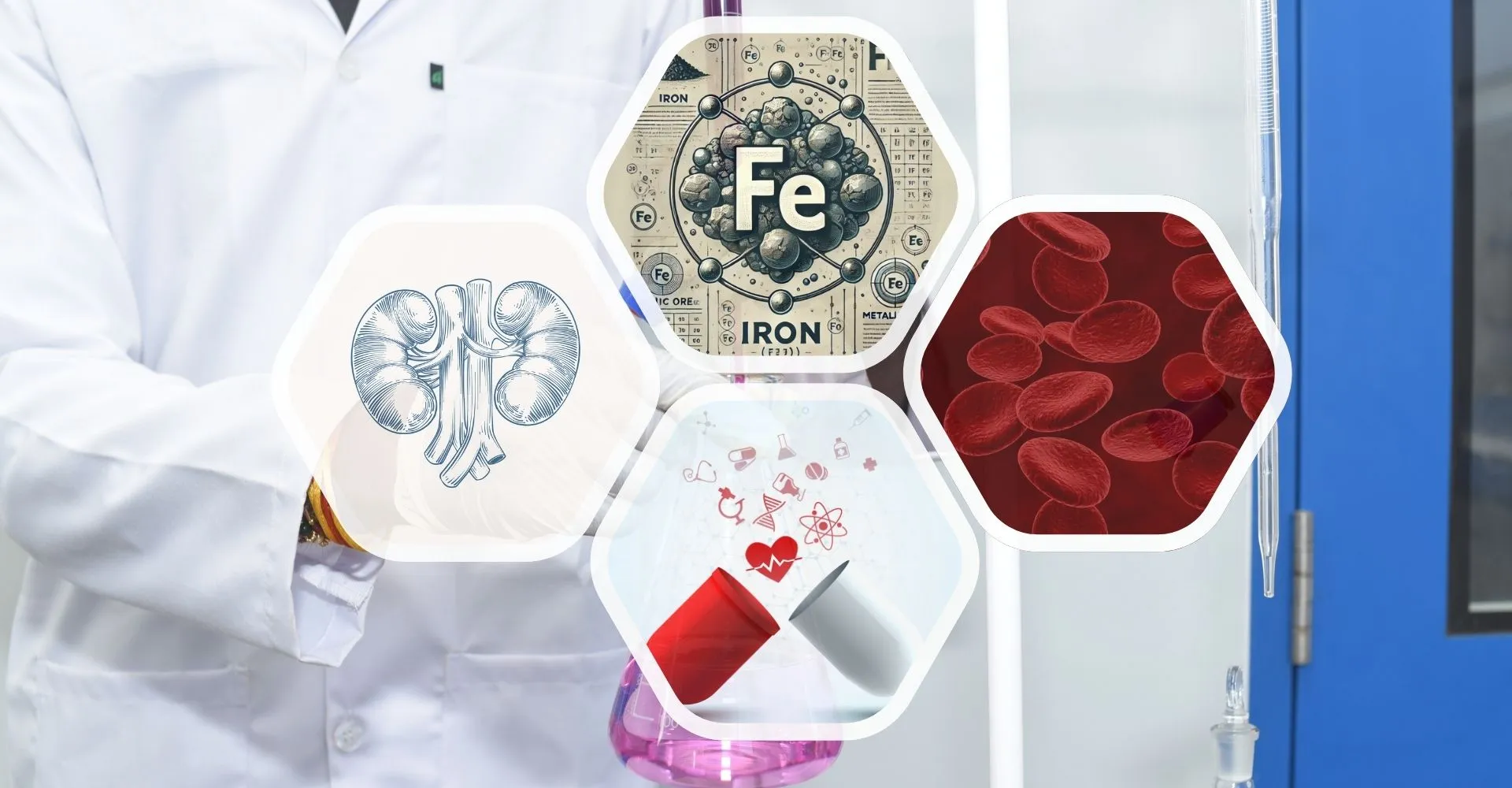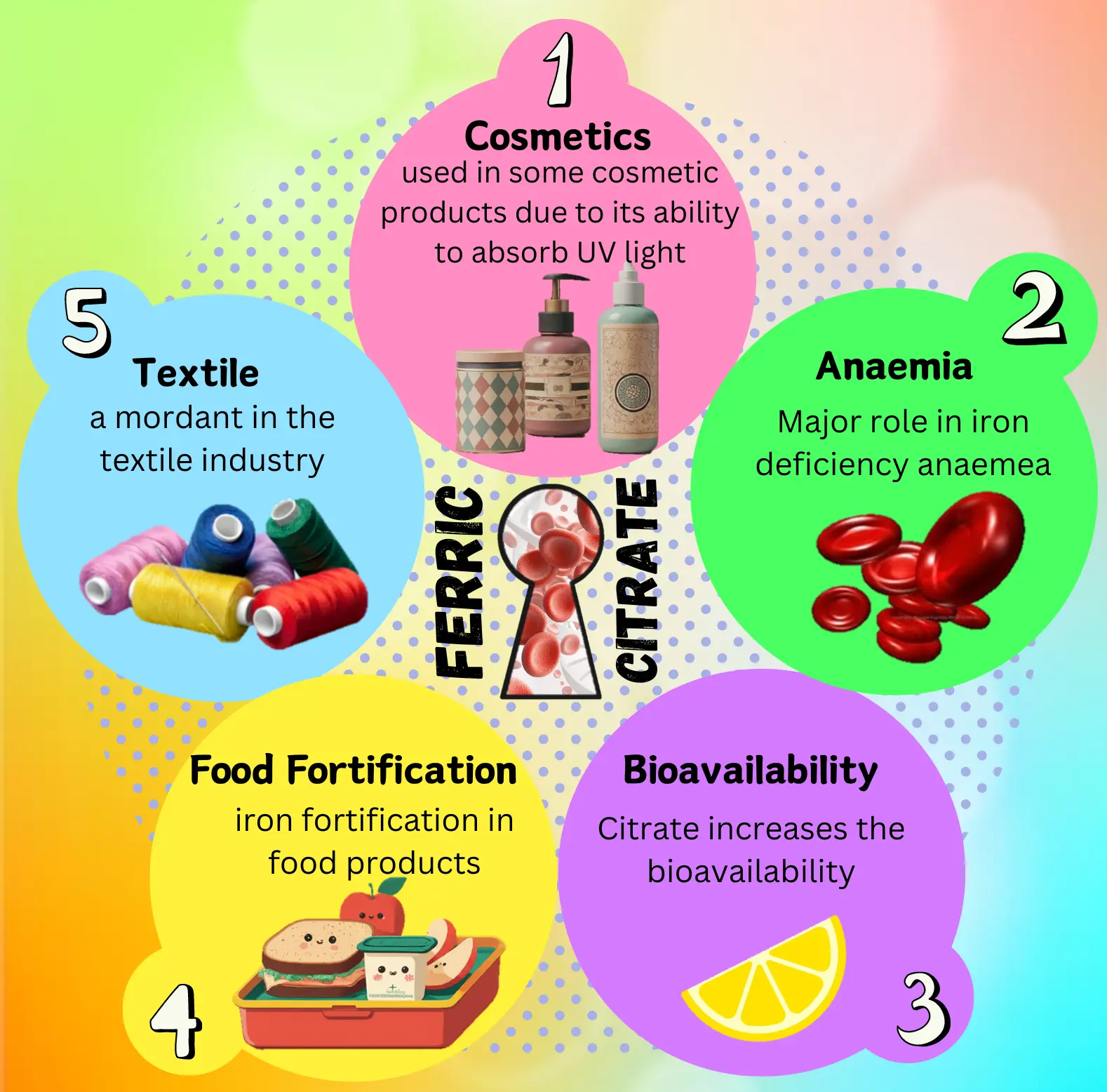Ferric Citrate- The Phosphate Pirate and the Iron Ally – A Tale of Two Functions
What is Ferric Citrate?
Ferric citrate, a name that might sound like a medieval weapon, hides a surprising duality in the world of medicine. While some might recognize it as an iron supplement, its true power lies in battling a silent threat – For people with Chronic Kidney Disease (CKD) on dialysis, its benefits are to control phosphorus levels in the blood.
Let’s hunt through into the fascinating science behind ferric citrate, exploring its phosphate-binding prowess and its hidden talent as an iron ally.
Ferric citrate, also known as iron (3+) citrate, is a complex molecule formed when ferric ions (Fe3+) bind to citrate, a molecule found in citrus fruits. The exact structure can vary depending on how the citrate binds to the iron, but it typically involves multiple citrate molecules surrounding a central iron atom. This complexation makes the iron more soluble and bioavailable, allowing for easier absorption by the body. Citric acid iron (III) salt often appears as an orange or red-brown powder and has the chemical formula C6H5FeO7.xH2O.

How Does Ferric Citrate Help Manage High Phosphate Levels in Chronic Kidney Disease?

The Phosphate Peril and the Rise of the Phosphate Pirate: ferric citrate for kidney disease
Chronic kidney disease (CKD), sometimes referred to as chronic renal failure, involves a progressive decline in kidney function over time. A normal phosphorus level is 2.5 to 4.5 mg/dL. As kidney function declines, phosphate excretion falters, leading to a pirate-like raid on the bloodstream, causing an unwanted surge in phosphate levels.
This excess phosphate isn’t just a passive villain; it weakens bones, increasing fracture risk, and contributes to vascular calcification, a hardening of arteries. Dialysis, a lifesaving treatment for patients with severe chronic kidney disease, artificially removes waste products and excess fluids from the blood.
Extremely high phosphorus levels, though often symptomless, can manifest in some as fatigue, weakness, bone pain, and even seizures, while others may experience brittle nails, coarse hair, skin irritation, muscle cramps, or irregular heartbeat. However, a blood test remains the most reliable method for diagnosing this condition.
Here welcome ferric citrate supplement, a cunning pirate hunter disguised as a simple iron supplement. The magic lies in its iron core (Fe3+).
When it encounters dietary phosphate in the digestive tract, a remarkable scientific battle unfolds. The Fe3+ ions act like grappling hooks, readily binding to phosphate molecules, forming an insoluble complex called ferric phosphate. This newly formed entity is like a captured treasure chest – unappealing to the intestines and promptly eliminated in the stool. By effectively lowering blood phosphate levels, ferric citrate becomes a cornerstone therapy for managing hyperphosphatemia (high blood phosphate) in CKD patients.

Ferric citrate Side Effects:
It’s important to acknowledge that even the gentlest allies can have minor side effects. Ferric citrate, while gentler on the stomach than some iron supplements, can cause constipation, diarrhoea, nausea, or vomiting in some users.
Beyond managing phosphorus levels in dialysis patients with CKD, ferric citrate can also treat iron deficiency anaemia in those not requiring dialysis. Open communication with your doctor is crucial to manage these side effects and ensure a smooth treatment journey.
Ferric citrate 210mg of elemental iron per tablet offers the potential for higher total iron delivery compared to ferrous sulphate (65mg per tablet) while potentially causing fewer side effects. Report persistent or severe diarrhoea, constipation, nausea, or vomiting to your doctor while taking this medication.
Ferric citrate dosage:
Ferric citrate works by binding dietary phosphate in the gut, reducing its absorption and lowering blood phosphate levels in chronic kidney disease patients. Ferric citrate to ferrous sulphate conversion is not natural in the body, but the iron within ferric citrate can be absorbed and converted to ferrous iron for utilization.
Iron overdose is a major cause of fatal poisoning in children under 6, highlighting the importance of safe storage of iron supplements. Ferric citrate for children and adults is a prescription medication typically available through pharmacies or specialized medical suppliers depending on your needs.
Consult your doctor to determine the right source for you. For iron deficiency, explore iron-rich foods like red meat, leafy greens, and lentils alongside vitamin C sources to enhance absorption, before considering iron supplements with ferric citrate. Depending on your needs, ferric citrate alternative could include calcium-free phosphate binders like sevelamer or iron supplements like ferrous sulphate.
Discuss your situation with a doctor to find the best approach. While ferric citrate hydrate can be found in some supplements, it’s best to consult a doctor about iron deficiency and discuss if supplements or a prescription form like ferric citrate are right for you.
Important points to consider:
Prenatal vitamins with iron are a key weapon in preventing and treating iron deficiency anaemia, a common pregnancy concern.
Limited data exists on ferric citrate use during pregnancy, making it crucial to discuss potential risks and benefits with a doctor before taking it.
Ferric citrate for vegetarians, a gentle iron supplement, is a suitable option to boost iron intake.
Iron overdose is a serious threat for young children, leading to a significant number of fatal poisoning cases each year in children under 6. Discuss with your doctor
Ferric citrate interactions with medications: Ferric citrate API for pharmaceutical applications will decrease the level or effect of ciprofloxacin, deferiprone, doxycycline, Gemifloxacin, levofloxacin, moxifloxacin, ofloxacin, omadacycline by drug binding in GI tract.
The Verdict- A Multifaceted Warrior in Healthcare
Ferric citrate generic emerges as a multifaceted warrior, tackling both phosphate imbalances in CKD and iron deficiency. Its unique properties and gentle nature make it a valuable option for many. Remember, a doctor’s guidance is essential to harness the full potential of this scientific marvel and ensure you navigate the complexities of phosphate control and iron supplementation with confidence.
1. National Center for Biotechnology Information. PubChem Compound Summary for CID 61300, Ferric citrate. https://pubchem.ncbi.nlm.nih.gov/compound/Ferric-citrate. Accessed July 16, 2024.
2. Kocherlakota Chandrashekhar, Banda Nagaraju, Pharmaceutical compositions of ferric citrate, WO2016162794A1, French. https://patents.google.com/patent/WO2016162794A1/en
3. Yong Wang, Xiangmei Chen, Hanyu Zhu, Zhiyong Guo, Yibin Yang, Ping Luo, Yani He, Yan Xu, Daxi Ji, Xinlu Gao, Xiuli Sun, Changying Xing, Yu Wang, Xiaohui Wang, Shuping Zhao, Yan Guan, Hongli Lin, Aimin Zhong, Hua Shui, Fengmin Shao, Lu Lv, Yuehong Yan, Xiaokun Sun, Lei Zhang; Efficacy and Safety of Ferric Citrate on Hyperphosphatemia among Chinese Patients with Chronic Kidney Disease Undergoing Hemodialysis: A Phase III Multicenter Randomized Open-Label Active-Drug-Controlled Study. Am J Nephrol 12 December 2023; 54 (11-12): 479–488. https://doi.org/10.1159/000534484 https://karger.com/ajn/article/54/11-12/479/864547/Efficacy-and-Safety-of-Ferric-Citrate-on
4. McCullough PA, Uhlig K, Neylan JF, Pergola PE, Fishbane S. Usefulness of Oral Ferric Citrate in Patients with Iron-Deficiency Anemia and Chronic Kidney Disease with or Without Heart Failure. Am J Cardiol. 2018 Aug 15;122(4):683-688. doi: 10.1016/j.amjcard.2018.04.062. Epub 2018 May 19. PMID: 29961562. https://pubmed.ncbi.nlm.nih.gov/29961562/
5. Pablo E. Pergola, Diogo Belo, Paul Crawford, Moustafa Moustafa, Wenli Luo, Alexander Goldfarb-Rumyantzev, Youssef M.K. Farag; Ferric Citrate Dosing in Iron Deficiency Anemia in Nondialysis-Dependent Chronic Kidney Disease. Am J Nephrol 22 September 2021; 52 (7): 572–581. https://doi.org/10.1159/000516012. https://karger.com/ajn/article/52/7/572/821307/Ferric-Citrate-Dosing-in-Iron-Deficiency-Anemia-in
6. Gupta A. Ferric Citrate Hydrate as a Phosphate Binder and Risk of Aluminum Toxicity. Pharmaceuticals. 2014; 7(10):990-998. https://doi.org/10.3390/ph7100990
7. Choi YJ, Noh Y, Shin S. Ferric citrate in the management of hyperphosphataemia and iron deficiency anaemia: A meta-analysis in patients with chronic kidney disease. Br J Clin Pharmacol. 2021; 87: 414–426. https://doi.org/10.1111/bcp.14396. https://bpspubs.onlinelibrary.wiley.com/action/showCitFormats?doi=10.1111%2Fbcp.14396
8. Ferric Citrate Tablet – Uses, Side Effects, and More, WebMD. https://www.webmd.com/drugs/2/drug-166964/ferric-citrate-oral/details
9. Wikipedia contributors. Iron (III) citrate. Wikipedia, The Free Encyclopedia. May 6, 2024, 13:55 UTC. Available at: https://en.wikipedia.org/w/index.php?title=Iron(III)_citrate&oldid=1222531847. Accessed July 16, 2024.
10. Choi YJ, Noh Y, Shin S. Ferric citrate in the management of hyperphosphataemia and iron deficiency anaemia: A meta-analysis in patients with chronic kidney disease. Br J Clin Pharmacol. 2021; 87: 414–426. https://doi.org/10.1111/bcp.14396. https://bpspubs.onlinelibrary.wiley.com/action/showCitFormats?doi=10.1111%2Fbcp.14396
11. Ganz, T., Bino, A. & Salusky, I.B. Mechanism of Action and Clinical Attributes of Auryxia® (Ferric Citrate). Drugs 79, 957–968 (2019). https://doi.org/10.1007/s40265-019-01125-w
12. Haase VH. The ins and outs of ferric citrate. Kidney Int. 2022 Apr;101(4):668-670. doi: 10.1016/j.kint.2021.12.032. PMID: 35314048. https://pubmed.ncbi.nlm.nih.gov/35314048/
13. Ding X, Sun S, Zhang J, Zhao H, Lun F, Liu X, Zhen Y, Dong J, Wu J. Ferric citrate for the treatment of hyperphosphatemia and iron deficiency anaemia in patients with NDD-CKD: a systematic review and meta-analysis. Front Pharmacol. 2024 Mar 7;15:1285012. doi: 10.3389/fphar.2024.1285012. PMID: 38515853; PMCID: PMC10955115. https://pubmed.ncbi.nlm.nih.gov/38515853/#:~:text=Conclusion%3A%20This%20meta%2Danalysis%20found,iron%20intake%20and%20anaemia%20management.
14. Cada, Dennis; Cong, Jasen; Baker, Danial (2015). Ferric Citrate. Hospital Pharmacy, 50(2), 139–151. doi:10.1310/hpj5002-139. https://www.researchgate.net/publication/272837519_Ferric_Citrate
15. https://www.stlukesonline.org/health-services/health-information/healthwise/2017/06/27/13/14/ferric-citrate
16. Lee C-T, Lee C-C, Wu M-J, Chiu Y-W, Leu J-G, Wu M-S, et al. (2022) Long-term safety and efficacy of ferric citrate in phosphate-lowering and iron-repletion effects among patients with on hemodialysis: A multicenter, open-label, Phase IV trial. PLoS ONE 17(3): e0264727. https://doi.org/10.1371/journal.pone.0264727
17. Chertow GM, Block GA, Neylan JF, Pergola PE, Uhlig K, Fishbane S (2017) Safety and efficacy of ferric citrate in patients with nondialysis-dependent chronic kidney disease. PLoS ONE 12(11): e0188712. https://doi.org/10.1371/journal.pone.0188712
18. Yokoyama, K., Fukagawa, M., Akiba, T. et al. Randomised clinical trial of ferric citrate hydrate on anaemia management in haemodialysis patients with hyperphosphataemia: ASTRIO study. Sci Rep 9, 8877 (2019). https://doi.org/10.1038/s41598-019-45335-4
19. Komatsu, N., Arita, K., Mitsui, H. et al. Efficacy and safety of ferric citrate hydrate compared with sodium ferrous citrate in Japanese patients with iron deficiency anemia: a randomized, double-blind, phase 3 non-inferiority study. Int J Hematol 114, 8–17 (2021). https://doi.org/10.1007/s12185-021-03123-9
20. Männer K, Lester H, Henriquez-Rodriguez E. 2021. Ferric citrate is a safe and digestible source of iron in broilers and piglets. PeerJ 9:e12636 https://doi.org/10.7717/peerj.12636\
21. Haase VH, Intestinal uptake of iron delivered as ferric citrate | Iron Metabolism, Kidney Int. 2022 Apr;101(4):668-670. doi: 10.1016/j.kint.2021.12.032. https://www.haaselab.org/portfolio-items/haase-vh-iron-ferric-citrate-kidney-int-2022/#:~:text=These%20findings%20raised%20the%20possibility,aluminum%20in%20patients%20with%20CKD
22. ferric citrate (Rx), Medscape. https://reference.medscape.com/drug/auryxia-ferric-citrate-999932
23. https://www.sciencedirect.com/topics/medicine-and-dentistry/ferric-citrate
24. https://www.accessdata.fda.gov/drugsatfda_docs/label/2014/205874s000lbl.pdf
25. Le, H. T., Ferric citrate dosage forms, US10300039B2, United States. https://patents.google.com/patent/US10300039B2/en
26. FDA approves ferric citrate, invented at U-M, for CKD, Drug developed by U-M professor emeritus Chen Hsu, University of Michigan Health. https://www.uofmhealth.org/fda-approves-ferric-citrate-invented-u-m-ckd
27. https://medilib.ir/uptodate/show/96959
28. Melissa J. Webb, MA, Ferric citrate shows benefits over ferrous sulfate for treating iron deficiency in CKD, Nephrology news & Issues, healio, 2020. https://www.healio.com/news/nephrology/20200724/ferric-citrate-shows-benefits-over-ferrous-sulfate-for-treating-iron-deficiency-in-ckd
Ferric citrate is used primarily to control phosphorus levels in patients with chronic kidney disease (CKD) on dialysis and to treat iron deficiency anemia in those not requiring dialysis.
Ferric citrate binds dietary phosphate in the digestive tract, forming an insoluble complex that is eliminated in the stool. This helps lower blood phosphate levels in CKD patients. It also provides a bioavailable source of iron for treating iron deficiency anemia.
Common side effects include constipation, diarrhea, nausea, and vomiting. If you experience persistent or severe symptoms, you should contact your doctor.
The dosage of ferric citrate varies depending on individual needs. A typical starting dose is one gram three times daily with meals, but your doctor will determine the appropriate dosage for you.
It’s essential to discuss potential risks and benefits with your doctor before taking it if you are pregnant.
Ferric citrate provides iron in the Fe3+ form, which can be more easily absorbed and less irritating to the gut compared to Fe2+ forms like ferrous sulfate. It also offers higher total iron delivery per tablet.
Yes, ferric citrate can decrease the effectiveness of certain medications, such as ciprofloxacin, deferiprone, doxycycline, and others, by binding them in the GI tract. Always inform your doctor about all medications you are taking.
If you miss a dose, take it as soon as you remember, unless it is almost time for your next dose. In that case, skip the missed dose and resume your regular schedule. Do not double the dose to catch up.
Ferric citrate should be stored at room temperature, away from moisture and heat. Keep it out of reach of children to prevent accidental overdose.
Yes, ferric citrate is a suitable iron supplement for vegetarians, as it provides a gentle and effective way to boost iron intake without relying on animal sources.
